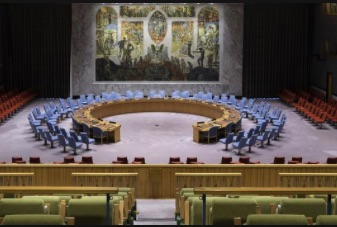FREE FLOW OF INFORMATION
An article from the United Nations
The United Nations should explore greater use of conflict prevention and mediation tools enshrined in its founding Charter, speakers told the Security Council today [June 12], as it examined the Organization’s long-standing culture of spending billions of dollars on addressing crises after failing to contain them before they fester.

“When we act early, and are united, we can successfully prevent crises from escalating, saving lives and reducing suffering – fulfilling the most fundamental mandate of the United Nations, as set out in the Preamble to the Charter,” said United Nations Secretary-General António Guterres.
Along with successful constitutional transfers of power in Mali and Madagascar, the rapprochement between Ethiopia and Eritrea and the revitalized agreement in South Sudan have created a sense of renewed hope, he said. Elsewhere, however, such as Yemen, Syria and Libya, serious challenges remain. Governments must make full use of the broad range of conflict prevention and resolution tools set out in Chapter VI of the Charter and the Council should use its authority to call on parties to pursue them.
Citing examples of his good offices and those of his envoys to help parties peacefully resolve differences, he said members of his High-Level Advisory Board on Mediation have given discreet counsel to him and his representatives on various political processes. Mediation advisers on the Standby Team have supported processes in Afghanistan, South Sudan, Papua New Guinea and Syria. The United Nations has also deepened its strategic and operational partnerships with regional and subregional organizations, with a special focus on Africa. However, prevention and mediation will not work without broader, more unified political efforts by all States. “That is the only way to meet our responsibilities to the people we serve,” he emphasized.
Mr. Guterres’ predecessor, Ban Ki-Moon, who is now Deputy Chair of The Elders – a group founded by Nelson Mandela of independent global leaders that promotes peace, justice and human rights – warned that the risk of nuclear conflict is at its highest in decades. Deeply concerned about the United States’ decision to withdraw from the Iranian nuclear deal, he said there is a very real risk that the global arms control and nuclear non-proliferation architecture is in danger of collapse through neglect, hubris and ill-founded threat analysis. That issue goes to the heart of the Council, whose five permanent members are all nuclear armed States with a unique and heavy responsibility.
Mary Robinson, former President of Ireland and Chair of The Elders, said the Council should be seen as an instrument of deliverance, a defender of rights and a provider of protection. “But too often over the decades the Council – and, particularly, its five permanent members – has failed to live up to its responsibilities and has favoured realpolitik or short-term power stratagems rather than meeting the solemn commitments outlined in the United Nations Charter,” she said. Moreover, insufficient attention has been paid to the role and voice of women on the ground in preventing conflict.
(continued in right column)
What is the United Nations doing for a culture of peace?
(continued from left column)
Sabah Khaled Al-Hamad Al-Sabah, Minister for Foreign Affairs of Kuwait and Council President for June, speaking in his national capacity, said conflicts today are increasingly complex and intertwined, but they could have been prevented through effective use of such Council tools as Chapter VI, which reaffirms the Council’s preventative role, and Chapter VIII, which encourages the peaceful resolution of local conflicts through regional mechanisms, as well as Article 99 which refers to the Secretary-General’s good offices. Mediation can save a lot of trouble, sorrow and pain, as well as the billions of dollars spent on peacekeeping operations and humanitarian action.
The representative of the United States, supporting that view, said mediation is an “underappreciated tool” that can save billions of dollars and many lives. More women should participate, he said, pointing to a study that showed peace agreements are 35 per cent more likely to last for 15 years when women are involved. His own country has been a leader in mediation efforts, he said, citing successes in Northern Ireland and Bosnia and Herzegovina.
Indonesia’s delegate said the Organization should focus on helping national and regional efforts to peacefully settle disputes, noting that his country and the Association of Southeast Asian Nations (ASEAN) have relied fundamentally on dialogue and consultation. Regional entities enjoy unique bonds of history and knowledge, he said, adding that “neighbours know best” and urging the Council to engage such entities from the earliest signs of potential conflict. Greater funding and more reliable support from the United Nations regular budget should underpin prevention and mediation efforts.
France’s delegate said that greater investment is also needed in post-conflict peacebuilding, including reconciliation, transitional justice and reconstruction to prevent conflict from reoccurring.
The speaker for the Russian Federation warned that conflict prevention is not a panacea and should not be used as a shield for interfering in States’ internal affairs. The situations in Iraq, Libya and Syria are examples of the consequences of shameless outside intervention, he said, adding that the most successful mediation in Venezuela is being conducted by States that are not taking sides there. United Nations mediators should be selected on the basis of objective criteria and with respect for regional balance, he stressed.
Also speaking today were representatives of China, United Kingdom, Dominican Republic, Germany, South Africa, Peru, Equatorial Guinea, Poland, Côte d’Ivoire and Belgium.
(Thank you to Phyllis Kotite, the CPNN reporter for this article.)